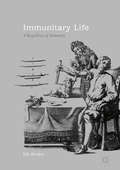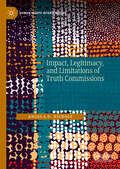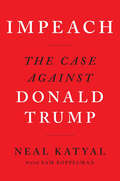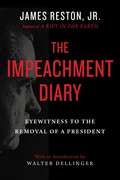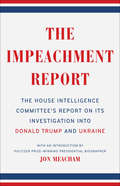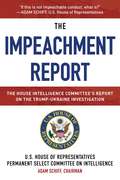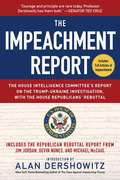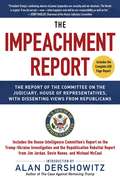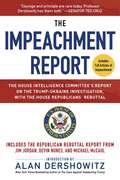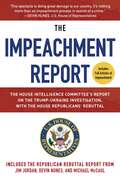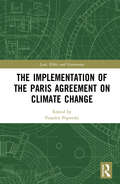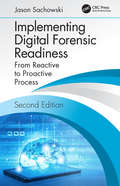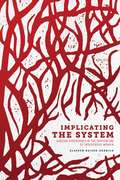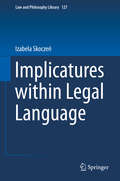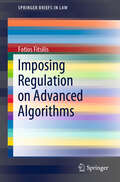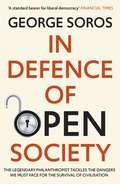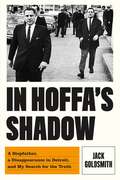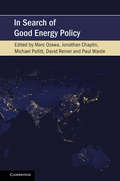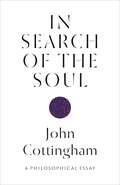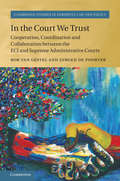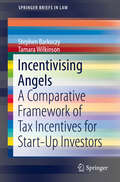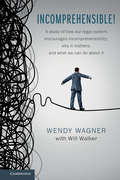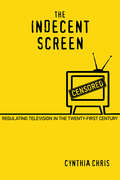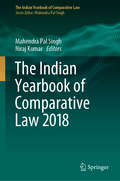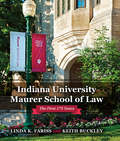- Table View
- List View
Immunitary Life: A Biopolitics of Immunity
by Nik BrownThis book explores the growing intellectual interest in the politics of immunity. It argues that taking an ‘immunitary perspective’ is necessary if we are to better appreciate the body as a site of politics in the contemporary age. It explores the dynamic tensions between community and immunity, belonging and fragmentation, the social and the individual. It creates a dialogue between the social sciences, humanities and biopolitical philosophy around immunity. Immunitary Life empirically situates immunitary politics in real-world debates. This includes blood donation and evolving notions of embodied intimacy in the worlds of transplantation. It examines changing ideas about infectivity, bugs, and the emergence of ‘resistance’ in antibiotics. The politics of vaccination offers a classic context for thinking about the ever changing relationships between the communal and the individual. Immunitary Life is essential reading for contemporary scholarship in the sociology of the body and the political philosophy of biomedicine.
Impact, Legitimacy, and Limitations of Truth Commissions (Human Rights Interventions)
by Angela D. NicholsThis book develops a theoretical understanding of how truth commissions achieve legitimacy and contribute to peace and stability. Angela D. Nichols argues that truth commissions are most likely to impact society when they possess certain institutional characteristics—characteristics that send important political signals to the state and broader society alike. If these signals suggest greater degrees of authority, a break with the past, and transparency in both its investigations and its findings, the truth commission is more likely to impact society. In particular, Nichols examines whether or not states that adopt truth commissions with these characteristics are more likely to respect human rights and experience lower levels of violence. She concludes with an analysis of Colombia’s newly established Truth, Coexistence, and Non-Recurrence Commission.
Impeach: The Case Against Donald Trump
by Neal Katyal Sam KoppelmanAn acclaimed Supreme Court lawyer and former Acting Solicitor General argues why impeachment is the only remedy for the dangers posed by President Trump.No one is above the law. This belief is as American as freedom of speech and turkey on Thanksgiving—held sacred by Democrats and Republicans alike. But as the celebrated Supreme Court Lawyer and former acting solicitor general Neal Katyal argues in Impeach, if President Trump is not held accountable for repeatedly asking foreign powers to interfere in the 2020 presidential election, this could well mark the end of our democracy. After all, as President George Washington said in his Farewell Address: “Foreign influence is one of the most baneful foes of our republican government.”Impeachment should always be our last report, explains Katyal, an “extreme centrist,” but our founders, our principles, and our Constitution leaves us with no choice but to impeach President Trump—before it’s too late.An instant New York Times bestseller.
The Impeachment Diary: Eyewitness to the Removal of a President
by James RestonThis eyewitness account of the impeachment process against Richard Nixon holds lessons for our own time. James Reston, Jr., took leave from teaching during the summer of 1973 to witness the Senate Watergate Committee hearings as he worked with his coauthor on what became the first full-length book to advocate for Richard Nixon's impeachment. During the following summer, he returned to Washington, DC, to witness the final act of the impeachment drama, attending the Watergate trials, Supreme Court deliberations over executive privilege, and House Judiciary Committee hearings to consider and eventually vote on articles of impeachment. In the exciting days after the smoking gun tape was revealed, Reston joined the throng of reporters at the White House, hungry for news of Nixon's response. When he arrived in Washington, he decided to keep a diary. The Impeachment Diary is his contemporaneous account of those heady, uncertain times: when a president, having been investigated by a special counsel and Congress, was called to account for acts contrary to his oath and office, and fundamental questions about the Constitution were engaged. The diary offers lessons—both insights and cautions—for our own time. Former solicitor general of the United States and constitutional scholar Walter Dellinger has provided an introduction discussing the nature and meaning of impeachment and helping to draw the links between then and now.
The Impeachment Report: The House Intelligence Committee's Report on Its Investigation into Donald Trump and Ukraine
by The House Intelligence CommitteeThe official report from the House Intelligence Committee on Donald Trump’s secret pressure campaign against Ukraine, featuring an exclusive introduction by Pulitzer Prize–winning author and biographer Jon Meacham For only the fourth time in American history, the House of Representatives has conducted an impeachment inquiry into a sitting United States president. This landmark document details the findings of the House Intelligence Committee's historic investigation of whether President Donald J. Trump committed impeachable offenses when he sought to have Ukraine announce investigations of former vice president Joe Biden and his son Hunter. Penetrating a dense web of connected activity by the president, his ambassador Gordon Sondland, his personal attorney Rudolph Giuliani, and many others, these pages offer a damning, blow-by-blow account of the president’s attempts to “use the powers of his office to solicit foreign interference on his behalf in the 2020 election” and his subsequent attempts to obstruct the House investigation into his actions. Published here with an introduction offering critical context from bestselling presidential historian Jon Meacham, The Impeachment Report is necessary reading for every American concerned about the fate of our democracy.
The Impeachment Report: The House Intelligence Committee's Report on the Trump-Ukraine Investigation
by U.S. House Permanent Select Committee on IntelligenceThe Official Impeachment Inquiry Report on The Results of The Trump-Ukraine Investigation, from The U.S. House Of Representatives Permanent Select Committee on Intelligence. This groundbreaking report—released by the U.S. House Of Representatives Permanent Select Committee on Intelligence, chaired by Adam Schiff—contains the results of the impeachment inquiry into President Donald Trump&’s actions as he sought for Ukraine to announce investigations into Hunter Biden, as well as the Committee&’s conclusions about whether those actions are impeachable offenses. Covering topics ranging from the anonymous whistleblower&’s first attempts to spread the word about Trump&’s phone call with Ukrainian President Volodymyr Zelensky, to the Congressional testimony of Trump&’s advisors and ambassadors, to the statements of Rudy Giuliani and William Barr, and even the President&’s efforts to influence the inquiry, The Impeachment Report offers readers the full findings of the Intelligence Committee&’s investigation. It is the ultimate resource for anyone who wants to know whether impeachment is warranted, and is a critical text in the ongoing back-and-forth battle to protect American democracy.
The Impeachment Report: The House Intelligence Committee's Report on the Trump-Ukraine Investigation, with the House Republicans' Rebuttal
by U.S. House Permanent Select Committee on IntelligenceWith an Introduction by Acclaimed Legal Scholar and New York Times Bestselling author Alan Dershowitz, The Official Impeachment Inquiry Report on The Results of The Trump-Ukraine Investigation—Plus the Articles of Impeachment and the Republican Report Disputing the Results of the Democratic Investigation. Donald Trump is on the verge of being only the third US President impeached by the House of Representatives, but is this a case of a president abusing his power and obstructing justice, or is it a partisan witch hunt protecting the Deep State? Can you trust the mainstream media, or do you want to read the Report for yourself? This groundbreaking report—released by the U.S. House Of Representatives Permanent Select Committee on Intelligence, chaired by Adam Schiff—contains the results of the impeachment inquiry into President Donald Trump&’s actions as he sought for Ukraine to announce investigations into Hunter Biden, as well as the Committee&’s conclusions about whether those actions are impeachable offenses. Covering topics ranging from the anonymous whistleblower&’s first attempts to spread the word about Trump&’s phone call with Ukrainian President Volodymyr Zelensky, to the Congressional testimony of Trump&’s advisers and ambassadors, to the statements of Rudy Giuliani and William Barr, and even the President&’s efforts to influence the inquiry, The Impeachment Report offers readers the full findings of the Intelligence Committee&’s investigation, the articles of impeachment themselves, a rebuttal report from Republican representatives that disputes the process and results of the Democratic investigation, an introduction by esteemed attorney Alan Dershowitz, and information about the impeachment process itself. It is the ultimate resource for anyone who wants to know whether impeachment is warranted, and is a critical text in the ongoing back-and-forth battle to protect American democracy.
The Impeachment Report: The Report of the Committee on the Judiciary, House of Representatives, with Dissenting Views from Republicans
by U.S. House Committee on the JudiciaryThe Official Report of the House Judiciary Committee on the Impeachment—Plus the Dissenting Views from Republicans, the full Impeachment Inquiry Report on The Results of The Trump-Ukraine Investigation, the Articles of Impeachment and the Republican Report Disputing the Results of the Democratic Investigation, as well as an Introduction by Acclaimed Legal Scholar Alan Dershowitz This groundbreaking report—released by the US House Committee on the Judiciary, chaired by Jerry Nadler—contains the results of the impeachment inquiry into President Donald Trump&’s actions as he sought for Ukraine to announce investigations into Hunter Biden, as well as an explanation of the committee's process and its justification for recommending two articles of impeachment against Trump, abuse of power and obstruction of Congress. This new report, separated into four parts, details the process by which the House Intelligence Committee investigated the case against Trump. Part Two is dedicated to examining the standards of impeachment laid out in the Constitution. Part Three delves into the proof and details of the Democrats' case that Trump abused the power of his office to pressure the Ukrainian government to investigate his political rival and interfere in the 2020 presidential election. Finally, Part Four makes the case that President Trump obstructed Congress's ability to hold the executive branch accountable by defying House investigators' requests for documents and testimony. Besides including the House Judiciary Committee's full report, The Impeachment Report also presents the Dissenting Views from Republicans, the findings of the Intelligence Committee&’s investigation in the full original impeachment report, the articles of impeachment themselves, a rebuttal report from Republican representatives that disputes the process and results of the Democratic investigation, and an introduction by esteemed attorney Alan Dershowitz. It is the ultimate resource for anyone who wants to know whether impeachment is warranted, and is a critical text in the ongoing back-and-forth battle to protect American democracy.
The Impeachment Report: The House Intelligence Committee's Report on the Trump-Ukraine Investigation, with the House Republicans' Rebuttal
by U.S. House Permanent Select Committee on IntelligenceThe Official Impeachment Inquiry Report on The Results of The Trump-Ukraine Investigation—Plus the Articles of Impeachment and the Republican Report Disputing the Results of the Democratic Investigation, as well as an Introduction by Acclaimed Legal Scholar Alan Dershowitz This groundbreaking report—released by the U.S. House Of Representatives Permanent Select Committee on Intelligence, chaired by Adam Schiff—contains the results of the impeachment inquiry into President Donald Trump&’s actions as he sought for Ukraine to announce investigations into Hunter Biden, as well as the Committee&’s conclusions about whether those actions are impeachable offenses. Covering topics ranging from the anonymous whistleblower&’s first attempts to spread the word about Trump&’s phone call with Ukrainian President Volodymyr Zelensky, to the Congressional testimony of Trump&’s advisers and ambassadors, to the statements of Rudy Giuliani and William Barr, and even the President&’s efforts to influence the inquiry, The Impeachment Report offers readers the full findings of the Intelligence Committee&’s investigation, the articles of impeachment themselves, a rebuttal report from Republican representatives that disputes the process and results of the Democratic investigation, an introduction by esteemed attorney Alan Dershowitz, and information about the impeachment process itself. It is the ultimate resource for anyone who wants to know whether impeachment is warranted, and is a critical text in the ongoing back-and-forth battle to protect American democracy.
The Impeachment Report: The House Intelligence Committee's Report on the Trump-Ukraine Investigation, with the House Republicans' Rebuttal
by U.S. House Permanent Select Committee on IntelligenceThe Official Impeachment Inquiry Report on The Results of The Trump-Ukraine Investigation—Plus the Articles of Impeachment and the Republican Report Disputing the Results of the Democratic Investigation This groundbreaking report—released by the U.S. House Of Representatives Permanent Select Committee on Intelligence, chaired by Adam Schiff—contains the results of the impeachment inquiry into President Donald Trump&’s actions as he sought for Ukraine to announce investigations into Hunter Biden, as well as the Committee&’s conclusions about whether those actions are impeachable offenses. Covering topics ranging from the anonymous whistleblower&’s first attempts to spread the word about Trump&’s phone call with Ukrainian President Volodymyr Zelensky, to the Congressional testimony of Trump&’s advisers and ambassadors, to the statements of Rudy Giuliani and William Barr, and even the President&’s efforts to influence the inquiry, The Impeachment Report offers readers the full findings of the Intelligence Committee&’s investigation, the articles of impeachment themselves, a rebuttal report from Republican representatives that disputes the process and results of the Democratic investigation, and information about the impeachment process itself. It is the ultimate resource for anyone who wants to know whether impeachment is warranted, and is a critical text in the ongoing back-and-forth battle to protect American democracy.
The Implementation of the Paris Agreement on Climate Change (Law, Ethics and Governance)
by Vesselin PopovskiIn December 2015, 196 parties to the United Nations Framework Convention on Climate Change (UNFCCC) adopted the Paris Agreement, seen as a decisive landmark for global action to stop human- induced climate change. The Paris Agreement will replace the 1997 Kyoto Protocol which expires in 2020, and it creates legally binding obligations on the parties, based on their own bottom-up voluntary commitments to implement Nationally Determined Contributions (NDCs). The codification of the climate change regime has advanced well, but the implementation of it remains uncertain. This book focuses on the implementation prospects of the Agreement, which is a challenge for all and will require a fully comprehensive burden- sharing framework. Parties need to meet their own NDCs, but also to finance and transfer technology to others who do not have enough. How equity- based and facilitative the process will be, is of crucial importance. The volume examines a broad range of issues including the lessons that can be learnt from the implementation of previous environmental legal regimes, climate policies at national and sub-national levels and whether the implementation mechanisms in the Paris Agreement are likely to be sufficient. Written by leading experts and practitioners, the book diagnoses the gaps and lays the ground for future exploration of implementation options. This collection will be of interest to policy-makers, academics, practitioners, students and researchers focusing on climate change governance.
Implementing Digital Forensic Readiness: From Reactive to Proactive Process, Second Edition
by Jason SachowskiImplementing Digital Forensic Readiness: From Reactive to Proactive Process, Second Edition presents the optimal way for digital forensic and IT security professionals to implement a proactive approach to digital forensics. The book details how digital forensic processes can align strategically with business operations and an already existing information and data security program. Detailing proper collection, preservation, storage, and presentation of digital evidence, the procedures outlined illustrate how digital evidence can be an essential tool in mitigating risk and redusing the impact of both internal and external, digital incidents, disputes, and crimes. By utilizing a digital forensic readiness approach and stances, a company’s preparedness and ability to take action quickly and respond as needed. In addition, this approach enhances the ability to gather evidence, as well as the relevance, reliability, and credibility of any such evidence. New chapters to this edition include Chapter 4 on Code of Ethics and Standards, Chapter 5 on Digital Forensics as a Business, and Chapter 10 on Establishing Legal Admissibility. This book offers best practices to professionals on enhancing their digital forensic program, or how to start and develop one the right way for effective forensic readiness in any corporate or enterprise setting.
Implicating the System: Judicial Discourses in the Sentencing of Indigenous Women
by Elspeth Kaiser-DerrickIndigenous women continue to be overrepresented in Canadian prisons; research demonstrates how their overincarceration and often extensive experiences of victimization are interconnected with and through ongoing processes of colonization. "Implicating the System: Judicial Discourses in the Sentencing of Indigenous Women" explores how judges navigate these issues in sentencing by examining related discourses in selected judgments from a review of 175 decisions. The feminist theory of the victimization-criminalization continuum informs Elspeth Kaiser-Derrick’s work. She examines its overlap with the Gladue analysis, foregrounding decisions that effectively integrate gendered understandings of Indigenous women’s victimization histories, and problematizing those with less contextualized reasoning. Ultimately, she contends that judicial use of the victimization-criminalization continuum deepens the Gladue analysis and augments its capacity to further its objectives of alternatives to incarceration. Kaiser-Derrick discusses how judicial discourses about victimization intersect with those about rehabilitation and treatment, and suggests associated problems, particularly where prison is characterized as a place of healing. Finally, she shows how recent incursions into judicial discretion, through legislative changes to the conditional sentencing regime that restrict the availability of alternatives to incarceration, are particularly concerning for Indigenous women in the system.
Implicatures within Legal Language (Law and Philosophy Library #127)
by Izabela SkoczeńThis book proposes a novel, descriptive theory that unveils the linguistic mechanisms lurking behind judicial decisions. It offers a comprehensive account of the ongoing debate, as well as a novel solution to the problem of understanding legal pragmatics.Linguistic pragmatics is based on a theory created by Paul Grice, who observed that people usually convey more than just the amalgam of the meaning of the words they use. He labeled this surplus of meaning a “conversational implicature.” This book addresses the question of whether implicatures occur in the legal language, firstly illustrating why the classic Gricean theory is not applicable (without substantial modification) to the description of legal language and proposing a novel approach based on a modification of Andrei Marmor’s “strategic speech.” Subsequently, it analyzes neo-Gricean theories and their limited use for describing the mechanisms of legal interpretation, and discusses the possibility of pragmatic enrichment of legal content as well as the notion of completeness of a legal proposition. Lastly, it illustrates how the developed theory works in practice, with examples from penal and civil law cases. The book is helpful to legal practitioners, since it provides insights into the reasons for and linguistic mechanisms behind courts’ decisions, but also to philosophers of law, philosophers of language, linguists and non-experts wishing to better understand the mechanisms of legal decision making.
Imposing Regulation on Advanced Algorithms (SpringerBriefs in Law)
by Fotios FitsilisThis book discusses the necessity and perhaps urgency for the regulation of algorithms on which new technologies rely; technologies that have the potential to re-shape human societies. From commerce and farming to medical care and education, it is difficult to find any aspect of our lives that will not be affected by these emerging technologies. At the same time, artificial intelligence, deep learning, machine learning, cognitive computing, blockchain, virtual reality and augmented reality, belong to the fields most likely to affect law and, in particular, administrative law. The book examines universally applicable patterns in administrative decisions and judicial rulings. First, similarities and divergence in behavior among the different cases are identified by analyzing parameters ranging from geographical location and administrative decisions to judicial reasoning and legal basis. As it turns out, in several of the cases presented, sources of general law, such as competition or labor law, are invoked as a legal basis, due to the lack of current specialized legislation. This book also investigates the role and significance of national and indeed supranational regulatory bodies for advanced algorithms and considers ENISA, an EU agency that focuses on network and information security, as an interesting candidate for a European regulator of advanced algorithms. Lastly, it discusses the involvement of representative institutions in algorithmic regulation.
In Defence of Open Society: The Legendary Philanthropist Tackles the Dangers We Must Face for the Survival of Civilisation
by George SorosGeorge Soros is among the world's most prominent public figures. He is one of the history's most successful investors and his philanthropy, led by the Open Society Foundations, has donated over $14 billion to promote democracy and human rights in more than 120 countries. But in recent years, Soros has become the focus of sustained right-wing attacks in the United States and around the world based on his commitment to open society, progressive politics and his Jewish background. In this brilliant and spirited book, Soros offers a compendium of his philosophy, a clarion call-to-arms for the ideals of an open society: freedom, democracy, rule of law, human rights, social justice, and social responsibility as a universal idea. In this age of nationalism, populism, anti-Semitism, and the spread of authoritarian governments, Soros's mission to support open societies is as urgent as it is important.
In Hoffa's Shadow: A Stepfather, A Disappearance in Detroit, and My Search for the Truth
by Jack GoldsmithOn July 30, 1975, Jimmy Hoffa, the renowned former leader of the Teamsters union, disappeared in broad daylight from the parking lot of the Machus Red Fox restaurant, in a Detroit suburb. Hoffa was one of the most famous people in America. His disappearance was a national sensation and proved to be one of the best-executed unsolved crimes in American history. Now, in this groundbreaking book, the distinguished legal thinker Jack Goldsmith illuminates Hoffa's disappearance and influence from a vital--and unexpected--new perspective. As a boy, Goldsmith adored his stepfather, Chuckie O'Brien, who was known to the world as Jimmy Hoffa's right-hand man of many years. Following Hoffa's disappearance, the FBI publicly accused O'Brien of picking up Hoffa at the Machus Red Fox and driving him to his death on behalf of the mob. As Goldsmith grew older and pursued a career in law and government, he began to doubt, and to distance himself from, the man he once revered. It was only years later, when Goldsmith was serving as an assistant attorney general in the George W. Bush administration and investigating the government's misuse of surveillance powers, that he began to reconsider O'Brien and his legacy. In Hoffa's Shadow tells the moving story of how Goldsmith reunited with the stepfather he once disowned and then set out to unravel one of the twentieth century's most persistent mysteries and to clear O'Brien's name. Goldsmith presents evidence that his stepfather did not betray Hoffa and relates his discussions with FBI agents who worked the case over the decades. He casts new light on the architects of Hoffa's disappearance, on the century-old surveillance state, and on how government investigators can ruin innocent lives through mistakes, neglect, and abuse. Goldsmith also explores the rise and fall of Hoffa, the mob, and labor unions, and--above all--probes the heartrending complexities of love and loyalty.
In Search of Good Energy Policy (Cambridge Studies on Environment, Energy and Natural Resources Governance)
by Marc Ozawa Jonathan Chaplin Michael Pollitt David Reiner Paul WardeDrawing on political science, economics, philosophy, theology, social anthropology, history, management studies, law, and other subject areas, In Search of Good Energy Policy brings together leading academics from across the social sciences and humanities to offer an innovative look at why science and technology, and the type of quantification they champion, cannot alone meet the needs of energy policy making in the future. Featuring world-class researchers from the University of Cambridge and other leading universities around the world, this innovative book presents an interdisciplinary dialogue in which scientists and practitioners reach across institutional divides to offer their perspectives on the relevance of multi-disciplinary research for 'real world' application. This work should be read by anyone interested in understanding how multidisciplinary research and collaboration is essential to crafting good energy policy.
In Search of the Soul: A Philosophical Essay
by John CottinghamHow our beliefs about the soul have developed through the ages, and why an understanding of it still matters todayThe concept of the soul has been a recurring area of exploration since ancient times. What do we mean when we talk about finding our soul, how do we know we have one, and does it hold any relevance in today’s scientifically and technologically dominated society? From Socrates and Augustine to Darwin and Freud, In Search of the Soul takes readers on a concise, accessible journey into the origins of the soul in Western philosophy and culture, and examines how the idea has developed throughout history to the present. Touching on literature, music, art, and theology, John Cottingham illustrates how, far from being redundant in contemporary times, the soul attunes us to the importance of meaning and value, and experience and growth. A better understanding of the soul might help all of us better understand what it is to be human.Cottingham delves into the evolution of our thoughts about the soul through landmark works—including those of Aristotle, Plato, and Descartes. He considers the nature of consciousness and subjective experience, and discusses the psychoanalytic view that large parts of the human psyche are hidden from direct conscious awareness. He also reflects on the mysterious and universal longing for transcendence that is an indelible part of our human makeup. Looking at the soul’s many dimensions—historical, moral, psychological, and spiritual—Cottingham makes a case for how it exerts a powerful pull on all of us.In Search of the Soul is a testimony to how the soul remains a profoundly significant aspect of human flourishing.
In the Court We Trust: Cooperation, Coordination and Collaboration between the ECJ and Supreme Administrative Courts (Cambridge Studies in European Law and Policy)
by Rob van Gestel Jurgen de PoorterThe preliminary reference procedure has long been envisaged as a judicial dialogue between the European Court of Justice and national courts. However, in reality the relationship appears to be closer to one of growing separation rather than to a happy marriage between equal partners. This book tries to find out: what is behind this? A study of the existing literature, combined with a case law analysis and interviews with judges, has shown that there are a number of important stumble blocks hindering the communication between these courts, such as language barriers, time constraints, and a failing digital infrastructure. However, on a deeper level there also appears to be a lack of mutual trust that prevents Supreme Administrative Courts from using the possibilities the procedure provides, such as the opportunity to offer provisional answers to the Court of Justice and the use of requests for clarification by the latter.
Incentivising Angels: A Comparative Framework of Tax Incentives for Start-Up Investors (SpringerBriefs in Law)
by Stephen Barkoczy Tamara WilkinsonThis book examines tax incentives for investors in start-up companies through a critical analysis of Australia’s early-stage investors (ESI) program, and a comparison of that program with the United Kingdom’s Seed Enterprise Investment Scheme (SEIS) upon which it is loosely modelled. It discusses the importance of innovation and the special role that venture capital plays in supporting start-ups, and explains the policy rationale for introducing the ESI program as well as dissecting its technical requirements in detail. Special attention is devoted to the program’s ‘early stage’ and ‘innovation’ requirements, which are crucial for determining whether a start-up qualifies for the tax incentives. The book is the first in-depth scholarly legal analysis of the ESI program and the first occasion it has been compared and contrasted with a foreign program. The comparative discussion of the ESI program with the SEIS program enables the authors to make suggestions for reforms to the ESI program so that it can better achieve its policy objectives. The fact that the book includes reform suggestions makes it particularly interesting for policy makers. It is also of broad relevance to legal and finance scholars and students as well as entrepreneurs, angels, venture capitalists and their advisors.
Incomprehensible!: A Study of How our Legal System Encourages Incomprehensibility, Why It Matters, and What We Can Do About It
by Wendy WagnerThe legal system is awash with excessive and incomprehensible information. Yet many of us assume that the unrelenting torrent of information pouring into various legal programs is both inevitable and unstoppable. We have become complacent; but it does not have to be this way. Incomprehensible! argues that surrendering to incomprehensibility is a bad mistake. Drawing together evidence from diverse fields such as consumer protection, financial regulation, patents, chemical control, and administrative and legislative processes, this book identifies a number of important legal programs that are built on the foundational assumption that 'more information is better'. Each of these legal processes have been designed in ways that ignore the imperative of meaningful communication. To rectify this systemic problem, the law must be re-designed to pay careful attention to the problem of incomprehensibility.
The Indecent Screen: Regulating Television in the Twenty-First Century
by Cynthia ChrisThe Indecent Screen explores clashes over indecency in broadcast television among U.S.-based media advocates, television professionals, the Federal Communications Commission, and TV audiences. Cynthia Chris focuses on the decency debates during an approximately twenty-year period since the Telecommunications Act of 1996, which in many ways restructured the media environment. Simultaneously, ever increasing channel capacity, new forms of distribution, and time-shifting (in the form of streaming and on-demand viewing options) radically changed how, when, and what we watch. But instead of these innovations quelling concerns that TV networks were too often transmitting indecent material that was accessible to children, complaints about indecency skyrocketed soon after the turn of the century. Chris demonstrates that these clashes are significant battles over the role of family, the role of government, and the value of free speech in our lives, arguing that an uncensored media is so imperative to the public good that we can, and must, endure the occasional indecent screen.
The Indian Yearbook of Comparative Law 2018 (The Indian Yearbook of Comparative Law)
by Mahendra Pal Singh Niraj KumarThis yearbook is a compilation of thematically arranged essays that critically analyseemerging developments, issues, and perspectives across different branches of law. Itconsists of research from scholars around the world with the view that comparativestudy would initiate dialogue on law and legal cultures across jurisdictions. The themesvary from jurisprudence of comparative law and its methodologies to intrinsic detailsof specific laws like memory laws. The sites of the enquiries in different chapters aredifferent legal systems, recent judgements, and aspects of human rights in a comparativeperspective. It comprises seven parts wherein the first part focuses on general themesof comparative law, the second part discusses private law through a comparative lens,and the third, fourth and fifth parts examine aspects of public law with special focuson constitutional law, human rights and economic laws. The sixth part engages withcriminal law and the last part of the book covers recent developments in the field ofcomparative law. This book intends to trigger a discussion on issues of comparativelaw from the vantage point of Global South, not only focusing on the Global North.It examines legal systems of countries from far-east and sub-continent and presentsinsights on their working. It encourages readers to gain a nuanced understanding ofthe working of law, legal systems and legal cultures, adding to existing deliberationson the constituents of an ideal system of law.
Indiana University Maurer School of Law: The First 175 Years (Well House Books)
by Linda K. Fariss Keith BuckleyThroughout its 175-year history, the Indiana University Maurer School of Law has grown, diversified, and flourished to become of a nationally recognized law school. With strong and dedicated leadership, the school has emerged into the 21st century stronger than ever and has partnerships among with leading institutions in the world, and an alumni base that spans the globe. Preparing student for the practice of law, promoting the best interests of society, and taking a leadership role in providing solutions to the most pressing problems of society, are among the many achievements of the school and its faculty. Filled with historical photographs and engaging sidebars, this book tells the story of the individuals who built, sustained, and strengthened the Indiana University Maurer School of Law.
